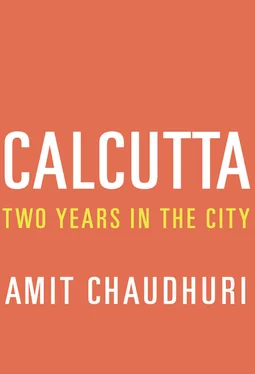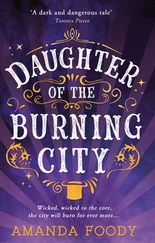From the other snatches of stammered speech, I learn that he withdrew from the city for a year (a third departure, then, of which I knew nothing) to Sylhet, after the Japanese dropped a bomb on Hatibagan in North Calcutta. Maybe he thought they’d blow up the whole place. He came back gingerly the next year, and began an articleship in incorporated accountancy — as he’d been advised to, shrewdly, by his best friend and still-to-be brother-in-law, because salaries in this line were said to be generous, and prospects generally excellent: because, whatever the fate of engineering companies and medical research, people would always need accountants. Unobtrusively, irrevocably, an important development took place: incorporated accountancy and chartered accountancy merged into one body. After being a relatively unemotional witness to the inevitable moment of Independence, shocked at the nights of post-Partition violence in the city, but recouping and resolving to travel towards becoming a chartered accountant, he made his first, official egress from this metropolis in 1949, sailing to England.
He was there for twelve years. My mother, who knew him since childhood, and was taken by surprise by his proposal of marriage before he left, was reconciling herself to his never returning — when he invited her to join him in London. She flew in 1955 from Shillong to Calcutta — with her mercurial younger brother, Dukhu, who was going on a training course for civil engineers in Germany. Customarily, it’s the bridegroom who makes the journey from his town or village or neighbourhood to the bride’s home to marry her; this was an eccentric, but unavoidable, inversion. My mother’s never been one to romanticise Calcutta — as I, for instance, have — but her first and brief impression of the city was one of beauty and clean air — the latter, if it lasted for more than two or three days that year, is not something that Calcutta has possessed for several decades. Perhaps it’s because it was a first encounter, or a transient acquaintanceship, or because she knew it would be her last vision of India for a long time, that my mother’s memory of Calcutta in 1955 is like a personal intimation.
My father, at last a full-fledged chartered accountant, with other professional qualifications like useful appendages, returned, with my mother, to a job offer in Bombay in 1961. Soon after, she was pregnant, as an Indian doctor in London had predicted she would be: “Childbearing has a lot to do with happiness and mental peace.” Coming back to India, at least in those days, was a matter of fulfilment, an occasion for optimism — something we tend not to remember or acknowledge. Dukhu had returned earlier from Germany, and had a job in Calcutta; he insisted my mother come to his house to have the child. The reason for this was a combination of practical need and common sense and the precedent of tradition, the last anyway being a consequence of the first two, not to mention economic hard-headedness. Tradition asks the childbearing woman to journey temporarily to her father’s house before giving birth. In this way, the nuisance of birth is wished away and literally transported to the “other” place. Importantly, the psychological closeness between mother and pregnant daughter is seen to be a necessary condition for the birth — a small bending of a regulation to briefly replace the mother-in-law’s vigilance with maternal attention; and the general support and care of her own family is essential to the mother-to-be. My mother had no in-laws to escape from; my father was an only child, displaced by Partition; both his parents were dead. So she kept putting off the journey to Dukhu’s flat on Fern Road, where their mother lived with him and his new wife. She knew it was going to be intolerably hot by the end of April. Still, because there was no family at all in Bombay, she arrived in Fern Road early that month. By temperament a nervous insomniac, she found sleeping difficult because of the yowling of street dogs at night and the passage of traffic at the Gol Park roundabout. My grandmother contributed to her well-being by knocking firmly on her door at around 6 a.m., just when she’d embarked on her first slumber, so she (my grandmother) might walk to the adjoining balcony and receive the city’s sounds and sights. As a result of decisions taken without conviction, and slightly regretted in retrospect — all, of course, is transmogrified by a mother’s eventual joy — I happened to be born in Calcutta in the middle of May: a difficult time of year to be here.
My father changed jobs. Leaving Bombay, he took up a position at the head office (which was then in Calcutta) of Britannia Biscuits. We lived, for a year and a half, between 1964 and 1965, in a recent suburb, New Alipore. I seem to summon, without too much effort, a memory of a veranda or porch, and the courtyard and the main road beyond: it could be, of course, that I’m imagining I remember these things. Their shapes and unremarkable colours, and the daylight they inhabit, are pretty consistent, though. This is the time that my mother is jotting down, in a book with a white hardback cover, all the relevant information concerning “Your Child’s Name” and “Your Child’s First Word.” I would see this solemnly inscribed book after growing up, but I think it is finally lost. I could have grown up in Calcutta, and had a very different relationship with it, but I am a Bombay person. By just a few years, I missed the trauma and the impress of change that would come upon this city. Britannia, anticipating labour unrest in the wake of radical left-wing politics, relocated its head office to a more amenable metropolis. What remained in Calcutta was a husk called the “Registered Office.” It was the usual story of the time: this gradual emptying of the city of commerce; the absolute reign over it of what it had always harboured — politics. My father, on the ascendant, left it for the second time.

It takes a while to understand that a city has changed, and that change, like most change, is irrevocable. By the time my parents moved back to Calcutta from Bombay in 1989, roughly seven years after my father’s retirement, the city itself had traversed a great distance from where it was when he’d left it in 1965. Besides clearly being in decline, it had the strange air of something that’s been a symbol of the zeitgeist for more than a hundred years, and now embodies nothing but its severance from what’s shaping the age. It had become a city that was difficult to connect with in an emotional and intellectual way. For me, in many ways, it was not the “true” Calcutta.
What was “true”? Throughout my childhood, I’d encountered Calcutta during the summer and winter holidays — as a place of freedom from school and a realm of childish anarchy. My uncle’s house — Dukhu’s house, now no longer in Fern Road, but further south, in petit bourgeois Pratapaditya Road, in a lane lined with two-storeyed, different-shaped houses — was my playground. I’ve written about that house and that Calcutta in so many works of fiction and essays that, when someone suggested I write a non-fiction book on this city, I put it off for years, because I felt I had nothing more to say about it. The Calcutta I’d encountered as a child was one of the great cities of modernity; it was that peculiar thing, modernity, that I first came into contact with here (without knowing it), then became familiar with it, and then was changed by it. By “modern” I don’t mean “new” or “developed,” but a self-renewing way of seeing, of inhabiting space, of apprehending life. By “modern” I also mean whatever alchemy it is that changes urban dereliction into something compelling, perhaps even beautiful. It was that arguable beauty that I first came across in Calcutta, and may have, without being aware of it, become addicted to. I ran into it again in New York in 1979, on my first American trip, after a stifling ten days among the monuments of Washington and the sweet prettiness of California. Walking in Manhattan, I was reminded, at once, of Calcutta. New York was in economically troubled times, and still possessed — even for the short-term adolescent visitor — an air of menace and fortuitous unpredictability. The addict of that particular strain of modernity, to whom noise and stink are oxygen, and odourless order death, can sniff it out quickly in foreign places, and swiftly connect it to their own history. 1979 was probably the last year of its reign. New York no longer reminds me of Calcutta; with globalisation — maybe even before it happened — the paths of these cities diverged. With Giuliani, New York famously gentrified its seedy areas; while Calcutta became one of those strategic, deceptively populated outreaches that the wave of globalisation has never quite managed to reach.
Читать дальше













